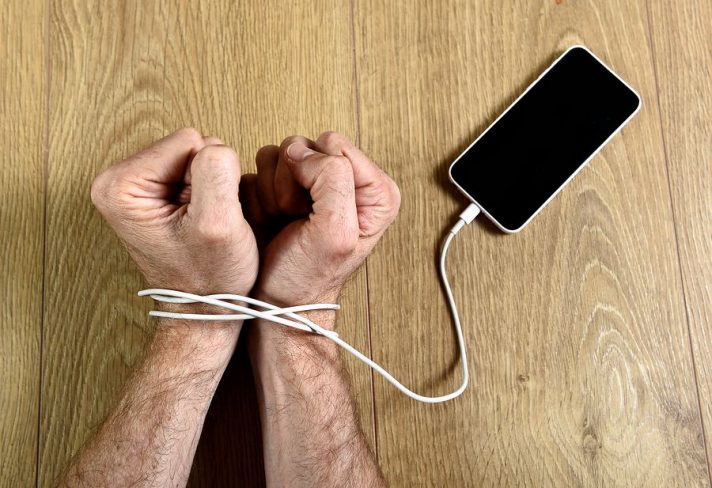
By Denny
Jan 7, 2019
What effects can phone screen time have on students? At first glance, it may seem harmless but when we decided to take a closer look, we found a strong correlation between too much phone time and lower grades.
With 95% of Americans owning a cell phone of some kind and actually 77% of them owning a smartphone (according to pewinternet), the topic of phone time and its potential effects comes into question.
So, we asked undergraduate university/college students what their daily phone screen time was the last 7 days and their current grade to see if there could be any correlation between them.
Methodology
Our survey consisted of 875 undergraduate post-secondary students (1st-year students aged 17-19) from a number of US schools.
To keep the survey simple, respondents were asked what their daily phone screen time was the last 7 days and their current grade.
From the results, there were many findings, especially once we dug a little deeper into the data.
Survey:https://docs.google.com/forms/d/e/1FAIpQLSeXtW_NcW0Ke9bxT0T98adTv8QexUG-O4YELiRrax-h5MDqDw/viewform?usp=sf_link
Phone Screen Time
First, we asked how many hours per day they spent on their phones in the last 7 days. This can easily be found by going into the settings in your phone and finding screen time which shows you a bunch of stats on your phone usage. Some cool things you can see are what categories you used your phone for (entertainment, productivity, etc.), what apps you used the most, how many times you picked up your phone, etc.
We found that 83% of respondents used their phone for at least 3 hours, while only 17% used it for less than 3 hours. This shows that the strong majority use their phones quite a lot throughout the week.
Furthermore, the most uncommon screen time was 0-1 hours which only 1% of respondents selected.
Impact on Grades
Furthermore, the most uncommon screen time was 0-1 hours which only 1% of respondents selected.
Impact on Grades
When looking at how screen time could affect students’ grades, we looked at the results in a number of different ways. Here are our findings:
Lowest Overall Grade
The lowest overall grade for those who have 0-1 hours of screen time is a B- compared to a D- for those who have 8+ hours of screen time.
Although it doesn’t necessarily mean that more phone time will give you a lower grade, it means that more phone time results in a higher likelihood to get a lower grade than a B-.
Variance The variance for those with 0-1 hours of phone time is approx. 3 compared to 9 for those with 8+
hours of phone time. Showing that with more hours of screen time, your grade will vary more from the average grade in each screen time category.
To explain this in a bit more detail, for example, if you have 0-1 hours of screen time and the average grade for this amount of screen time is an A-, your grade can be 3 grade levels lower or higher than A- meaning your grade will range from a B- to an A+.
But if you have 8+ hours of screen time and the average grade for this amount of screen time is a B+, your grade can be 9 grade levels lower or higher than a B+ meaning your grade can range all the way from a D- to an A+.
This shows that with less phone time, your grade is more stable around the average grade but with more phone time, your grade can fluctuate, a lot.
C’s and D’s
The percentage of students with 0-1 hours of phone time that have an overall grade of a C or D was 0% (0 people) but that number skyrockets to 17% (19 people) for those with 8+ hours of phone time.
The longer you spend on your phone, the higher the likelihood that you’ll get a lower grade (in the C’s or D’s).
According to Away for The Day, a study by Delaney Ruston on the effects of screen time, college
students participated in various cognitive tests with phones present and not present and it was found that “the presence of phones negatively impacted attention and task performance.”
In addition, Brenda Graves, a science teacher at Willoughby-Eastlake Schools,agrees with the impact that too much screen time can have not only on grades, but youth as a whole.
Awareness does not equal concern…we not only need more awareness but an awareness with a purpose. We need a call to action and accountability to use technology responsibly because overuse of anything can be considered an addiction and addictions reduce freedom and choice.'”
– Brenda Graves, Science Teacher
Things to Note
-Of course, students can use their phones to read digital textbooks or do other things related to studying but these findings all have the underlying assumption that phone screen time is typically associated with things such as social media apps, entertainment (Netflix, YouTube, etc.), games, etc.
-The relationship between screen time and grades is not a causal relationship but rather a correlation meaning that screen time doesn’t directly cause grades to go down, it’s just one factor that could potentially affect lower grades.
Therefore, there are many other factors to consider whenever looking at grades and how they can fluctuate. However, one could imagine that the more time spent looking at your phone, the less time you’ll have to do things like look at a textbook, complete assignments, etc. (online or physical) and this is why we wanted to see if there really was a correlation.
So, the answer to “does phone screen time affect grades?” is yes, it’s one factor that can negatively affect grades but it isn’t the only one, nor is it a direct causation, but rather a correlation.
Instead, the conclusion is that phone time significantly increases the possibility of getting a lower grade due to the increased variability that more phone time brings.
Not only can phone screen time affect your grades, but think of the things you could do if you just reduced your screen time even by a couple hours per week. Rather than spending those valuable hours on mindlessly scrolling through Instagram, spend it on trying to better yourself whether it’s academically, personally, or professionally. After all, time flies so we should all try to make each day count.
Make sure to check out these posts to help yourself stay focused during school or if you want to check out some other studies we’ve done!
How to Take Study Notes: 5 Effective Note Taking Methods and Essential Tips
Learn How to Memorize – Top 6 Memorization Techniques
New Study Shows Students’ Sleep Significantly Suffers before Exams
57.5% of College Graduates Don’t Work in Their Field of Study
Author – Daniel Je: daniel @ oneclass . com
















.png)







.jpg)










Δεν υπάρχουν σχόλια:
Δημοσίευση σχολίου
ΜΟΝΟ ΟΥ ΤΙ ΔΑΝΑ ΣΧΟΛΙΑ